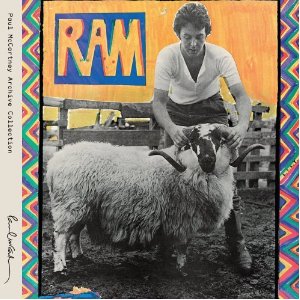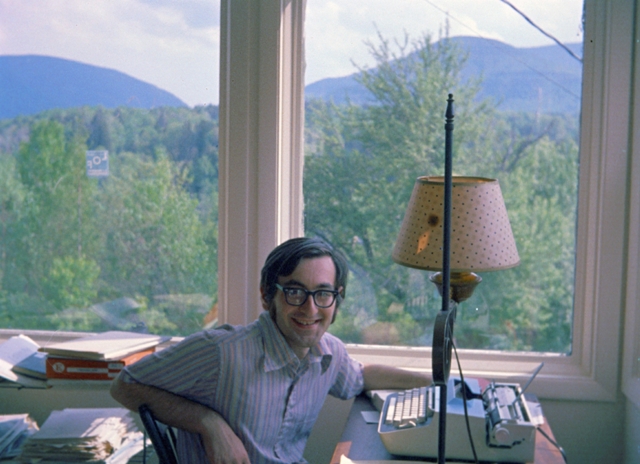Ride Away
Theme Songs Page | Previous Theme Song | Next Theme Song
Ride Away

Ram On, by Paul McCartney (1971), encountered 1972
Buy it here | See it here | Lyrics here
At first listen, Ram On seems like an inconsiderable song from an inconsiderable album, Ram (1971). The breakup of the Beatles had left Paul McCartney with less in the way of songwriting skills than it did George or John, at least at that stage. The decline into nonsense verse and Dadaism, into scraps that did not merge into a satisfying whole, a decline that had progressively marked everything the Beatles had done after Sgt. Pepper, was first and foremost Paul’s affliction, and it would take him some years to bring it under control. What had absolutely not deserted him was his ear for melody.
And there is much melody in this ditty, especially as contributed by a deceptively simple ukelele. Hearing that plangent instrument obsessing over a C# minor 7th chord[1] with McCartney’s sweet falsetto crooning the leading tone at the top and then swooping down through the chord to the tonic, lifts you into a sublime, solitary, and calm place.
Which is why it’s a theme song for me. Year Two of my marriage sort of turned out to be that kind of place, and this song, which I played a lot as I was going through it, helped me out.
Like the now-Beatle-less sound of McCartney on this album, everything I knew and valued was being presented to me in an alien way. Girlfriend was now wife, and our lives together were taking place in the strange town of Baltimore, not the familiar and comfortable Philadelphia where we’d met. English studies (in which I’d experienced such freedom and such a sense of exploration as an undergrad) had become abstruse, demanding and competitive, filtered through incomprehensible structuralist theory. And my parents who had once been too close now were far away, their space in my world largely preempted by a vociferous crew of in-laws. I felt adrift, rudderless, in my own life.
I don’t mean to say it was all bad, especially initially. The alien quality of it all would grow on me for a time (though not for all time). I found I was not overwhelmed for long, and actually began to master it.
 I found I liked being married, that my misgivings about the rigors of fidelity were misplaced, that I could learn to play the game in the English Department (the picture shows me writing the Peter Bell book, part of my efforts to fit in, in my own way).[2] I found also that my wife was moving on from her own disappointment with that Department, and that my in-laws, though cut from very different cloth, were good and reliable people. (And they were making the same discovery about me.)
I found I liked being married, that my misgivings about the rigors of fidelity were misplaced, that I could learn to play the game in the English Department (the picture shows me writing the Peter Bell book, part of my efforts to fit in, in my own way).[2] I found also that my wife was moving on from her own disappointment with that Department, and that my in-laws, though cut from very different cloth, were good and reliable people. (And they were making the same discovery about me.)
It didn’t hurt that I misunderstood the lyrics. McCartney sang:
Ram on, give your heart to somebody
Soon, right away, right away.
But what I heard was:
Ram on, give your heart to somebody,
Soon ride away, ride away.
What I heard, then, was that you could be empowered to ride away, to move on in some good way, by the act of giving your heart away. You just needed faith in the strangeness of love to be transported in that way. And if you listened to the second part of the song (buried 8 tracks further), you could hear what I had thought was riding music. It came across all jolly and heartening.
It was good music for starting the next phase of my life.
[1]. See here for ukelele tabs.
[2]. The book, which is reprinted in full in this blog here, was, among other things, an elaborate response to the demands of the Department that we focus on established authors and do so in what the Department considered high critical mode. The book was about a slew of established authors: Wordsworth, Shelley and Byron among others. So I was giving them what they ostensibly wanted, and in a full-length book to boot, an astonishingly ambitious act of homage. At the same time, however, it was a book about minor works by all of these great authors, and was of the exact format that, once upon a time in the years where scholarship reigned supreme over criticism, would have been an acceptable doctoral dissertation, namely a critical edition (the texts of the works with heavy annotations and apparatus to sort through the variations in the texts). You could regard this as somewhere between a poke in the nose at the Department and an effort to compromise. Although three pieces of the work were published as learned journal articles, I never impressed anyone with it. But at the time of the photo taken above, that disappointment was in the future.
Copyright (c) Jack L. B. Gohn, except for cover art
Tags:
1971,
1972,
Baltimore,
C# minor 7th,
George Gordon Lord Byron,
George Harrison,
John Lennon,
Lord Byron,
misunderstood lyrics,
Paul McCaqrtney,
Percy Bysshe Shelley,
Peter Bell,
Philadelphia,
Ram,
Ram On,
Sgt. Pepper,
structuralism,
The Beatles,
William Wordsworth
 I found I liked being married, that my misgivings about the rigors of fidelity were misplaced, that I could learn to play the game in the English Department (the picture shows me writing the Peter Bell book, part of my efforts to fit in, in my own way).[2] I found also that my wife was moving on from her own disappointment with that Department, and that my in-laws, though cut from very different cloth, were good and reliable people. (And they were making the same discovery about me.)
I found I liked being married, that my misgivings about the rigors of fidelity were misplaced, that I could learn to play the game in the English Department (the picture shows me writing the Peter Bell book, part of my efforts to fit in, in my own way).[2] I found also that my wife was moving on from her own disappointment with that Department, and that my in-laws, though cut from very different cloth, were good and reliable people. (And they were making the same discovery about me.)